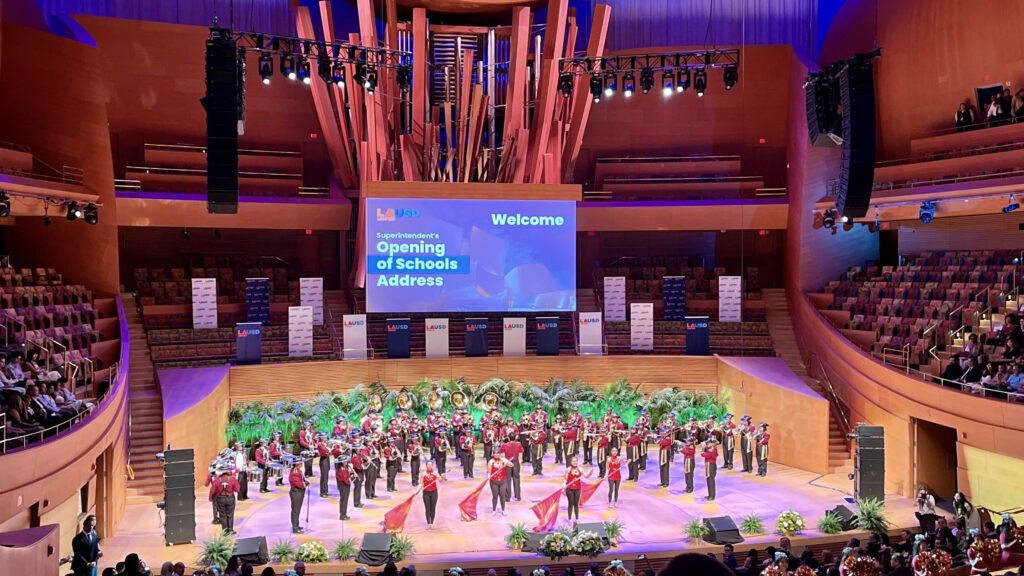
LAUSD Superintendent Alberto Carvalho unveils plans for 2023-24 academic year at Walt Disney Concert Hall in downtown Los Angeles on Aug. 4, 2023.
Credit: Mallika Seshadri / EdSource
This story was updated at 2:13 p.m. August 8 to add and clarify information received by LAUSD.
The Los Angeles Unified School District is gearing up for the 2023-24 academic year and plans to transform its strategy from building structures and coherence to accelerating student success by expanding basic services including housing, health care, meals and transportation.
District Superintendent Alberto Carvalho addressed district supporters at a packed Walt Disney Concert Hall in a theatrical display on Friday that included student music and dance performances from various campuses.
He also unveiled plans to expand and improve basic needs services for LAUSD students, families and workers.
“We are delivering on the realities that our communities face,” Carvalho said at a news conference after Friday’s event. “We are becoming the solutions that our students and their parents absolutely depend on.”
Health care access
Los Angeles Unified has launched a collaboration with Children’s Hospital Los Angeles, Hazel Health and Kokomo24/7 to provide all students with 24/7 telehealth services both on and off campus.
There are no requirements for eligibility, Carvalho said, and the program will be available from Aug.14, the first day of school.
Students will have access to both mental and physical health care — even for the “critical issues” that tend to get overlooked, like a cough, headache or rash.
Through these appointments, patients can also receive referrals to specialists.
“There are technologies that today you can actually send critical information, particularly if there’s a collaboration with our school nurses, where some degree of diagnostic input can be taken, and then sent over electronically to the provider,” Carvalho said.
Housing support
In a first for the district, LAUSD is planning to develop new residential housing for the district community through a collaboration with LA County’s housing department and a “mini mansions” program that targets families that qualify for Section 8 housing vouchers.
Beyond helping students and their families with housing support, the district is also looking into ways to provide similar support for its workforce.
Carvalho said the district has identified 20 possible sites — many of which wouldn’t require the district to tear down an existing structure.
The superintendent said the district is partnering with the city and developers to determine how many sites will be needed and identify any that can be readily converted to employee housing.
“We believe that we can be an effective partner in tearing down the silos that often existed in government and actually accelerate the building of units in our community for the betterment of our workforce.”
Meal services
LAUSD’s Food Services team announced “farm-to-school” prepared meals — alongside new food trucks that will “bring culturally connecting food to schools in our communities.”
“[We’re] changing the way we feed kids by actually cooking food in kitchens,” Carvalho said. “And the concept of farm-to-school will become a reality in Los Angeles Unified.”
Expanding transit
Los Angeles Unified is looking to put its robust fleet of school buses to work this coming year by increasing the number of students who ride the bus by 50%.
Currently, only 14% of students who are eligible take advantage of the service, Carvalho said.
Meanwhile, the district hopes to expand eligibility beyond those who are guaranteed transportation either because they have an IEP or attend a magnet school, so everyone who needs it has access.
He added that “radius of transportation,” or minimum distance from the school to be eligible for transportation should be reduced to ensure all students can travel to and from school safely.
“I’ve always felt uncomfortable with the radius of transportation that’s used in this district, which is currently five miles,” Carvalho said. “That is absolutely more than twice the average radius of guaranteed transportation in most large urban infrastructures.”
He added that the district has often used its buses as a “concierge-type service for students who have real hardships in terms of getting to schools.”
Expanding these bus services would not cost more, according to the superintendent.
“This year, we do not need to acquire additional buses. We do not need additional drivers,” Carvalho said. “This is an efficiency and effectiveness maneuver at no additional cost.”
Anticipating Needs
To meet student needs, Carvalho said the district must anticipate families’ unknown futures and disrupt any challenges they foresee.
The district will continue to be “all for all,” Carvalho said, and will stand for all students, regardless of their immigration status, socioeconomic background and sexual orientation.
“Will we sustain criticism? Will there be hecklers?” Carvalho stated. “Yes, there will, and we will welcome them … but not at the expense of the liberties and the rights of our children and adults who inspire them.”

